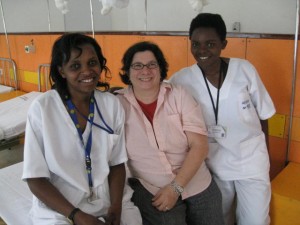by Barbara Virchick
On July 18, 2012, a Cancer Center of Excellence opened in Butaro, Rwanda, as a collaboration between Partners In Health and Dana-Farber/Brigham and Women’s Cancer Center. I was fortunate to have been there during this exciting time, working as part of a three-month fellowship to help train the nursing staff to care for Rwandan cancer patients.
I don’t think any of us were prepared for the explosion of patients who would arrive during the first month we were open.
Once they heard cancer drugs were available, patients showed up with old scans or biopsy reports of cancer, hoping to be treated. When I arrived on the ward one Monday morning, I found seven people I didn’t know in hospital beds. Some were scheduled for admission and others were waiting to see the clinic doctor, so they wandered in and found a place to rest for the night.
Unfortunately, I learned a great deal about the natural progression of untreated cancer during my time in Rwanda, as many of the patients who come to the center are often in late stages of their disease. Those who are biopsied sometimes have to wait months for results to come back from the U.S.

Hospital stays in Rwanda are very different from those in the U.S. When patients arrive on the ward, they are given sheets and a thin blanket, but no other supplies. The families handle all the personal care, including bathing, taking them to the bathroom, or emptying their bedpans. They feed their family member and provide their clothing. Because they have to travel so far for their treatment, patients receiving chemotherapy arrive the night before to get labs done then, stay over and get their treatment the next day. The day after that, they return home.
The day-to-day nursing operation took some time to get used to. The nurses have learned how to mix and administer the chemo for the 12 regimens that are being treated there. We are now working on teaching about side effects and how to manage them.
Despite the communication challenges (I only speak a tiny bit of French and no Kinyarwanda, which made it impossible to communicate directly with patients) I got big smiles from them when I came on the ward every day. I look forward to returning to Rwanda to see the progress we’ve made. We built a cancer center, and they came.
Barbara Virchick was part of a fellowship program that allows one Dana-Farber nurse at a time to work in the Cancer Center in Rwanda for three months.
